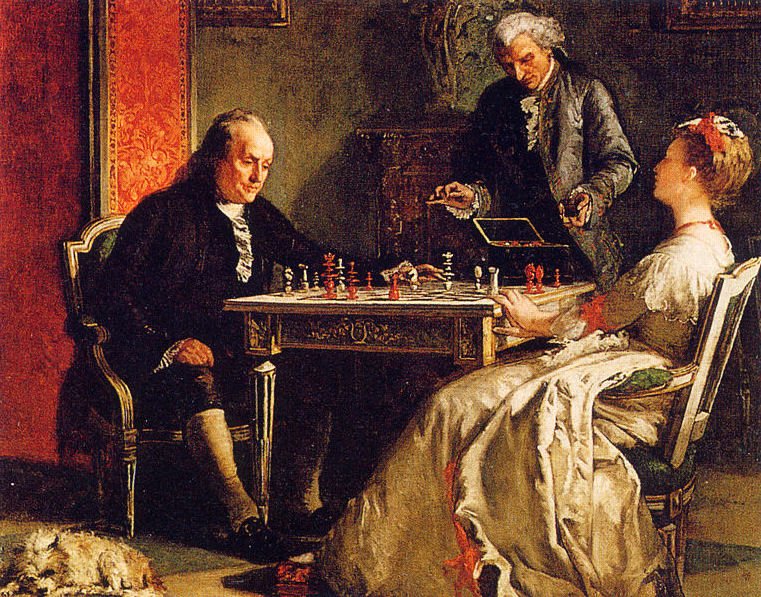Zara: The Vast Benefits of Playing a Simple Game of Chess
“The study was called The Impact of Chess Training on Creativity of Indian School Children. … The study analyzed the effect of one-year chess training on the creativity of children. [Researchers] concluded that “systematic chess training inculcates in the child the ability to think divergently and creatively.””
BY ZARA SHAH
THE SPENCE SCHOOL
Her League COACH & Her News COLUMNIST
Benjamin Franklin playing chess with Mrs. Howe - commons.wikimedia.org
Benjamin Franklin once wrote that the game of chess “is not merely an idle amusement (since) life is a kind of chess, in which we have often points to gain, and competitors or adversaries to contend with, and in which there is a vast variety of good and evil events that are in some degree the effects of prudence or the want of it.” Here, Franklin suggests that playing chess develops strong insightful thinking, foresight, perseverance and sportsmanship. Franklin makes the comparison between life and a chess game, implying that skills present in a strong chess player are important life skills. Playing chess holds many benefits in a young child's developmental process such as opening up a child’s perspective, broadening their creativity, increasing their focus and improving their social life and skills.
Playing chess can widen a child’s perspective. It is important to have an open mind and an ability to consider multiple or different perspectives because doing so allows one to overcome biases and think through situations more thoroughly. In a chess game, it is important to consider an opponent’s moves, future moves and potential ideas as well as one's own moves and plan of attack. In other words, one learns to see situations from other people’s points of view, which creates an open-minded way of thinking. Predicting events ahead of time using logic can also be applied to many life situations and can help with problem-solving abilities.
Chess is often seen by the general public (and even by chess players themselves) as a largely methodical activity and less as a creative one. This idea, however, is not necessarily true. Chess can help broaden one’s creativity. Creativity is defined as the use of the imagination or original ideas. A group of Indian professors, most of whom work in the department of psychology and one of whom is a chess player themselves, conducted an experimental study to assess the correlation between chess training and one’s creativity. The study was called The Impact of Chess Training on Creativity of Indian School Children. The researchers’ definition of creativity was the ability to produce work that is both novel and appropriate. The study analyzed the effect of one-year chess training on the creativity of children. They concluded that "systematic chess training inculcates in the child the ability to think divergently and creatively.” These findings are significant because creativity is diversely important in someone’s identity. Firstly, it allows one to view and solve problems more openly and with innovation. Secondly, it broadens one's perspective. Creativity also allows one to express themself freely, which can relate to one’s confidence and mental health.
Although chess is an individual game, there are many ways in which it is a social activity. Attending tournaments and being part of a school team creates an opportunity to build a community of friends and peers, all of whom share an interest. Playing chess also allows one to meet different types of people. Chess is played all over the country and world by people of all ages and backgrounds. One can be exposed to people of different backgrounds and experiences at tournaments or when playing on online websites such as chess.com. Being exposed to varying types of people is especially valuable for younger children because, as previously mentioned, doing so broadens their views and perspectives. Chess develops an active social life. This social life also teaches key social skills such as sportsmanship. Sportsmanship is a huge part of chess and is instilled in the youngest of players. To illustrate, (COVID allowing) opponents always shake hands before and after game play, regardless of the outcome.


